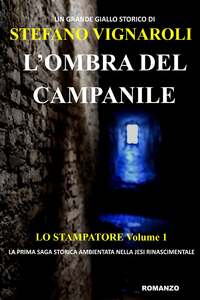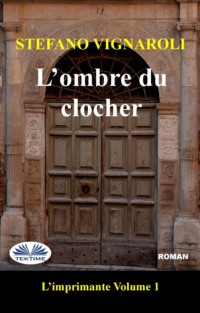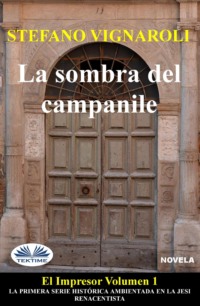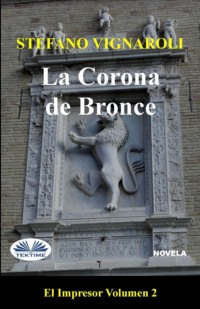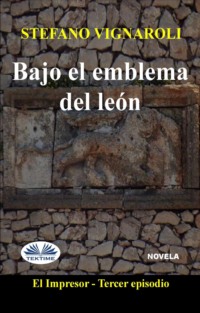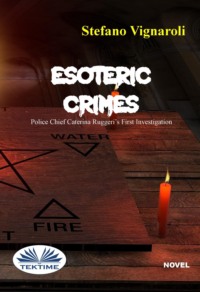
Полная версия
The Shadow Of The Bell Tower
«The sacred image of Our Lady, of Mary, of the mother of Jesus, accompanied by the inscription “Posuerunt me custodem”, they placed me in the custody of this dwelling.»
«And so here we venerate Our Lady, the Holy Virgin. But remember that all the places sacred to us who call ourselves Christians, Catholics, were erected over ancient pagan temples, and the ancient divinities were replaced with the new ones. The same cathedral next door was built above the ancient Roman baths, and the location of the crypt corresponds to the location of the temple that the Romans had dedicated to the Goddess Bona, another name for Diana. As you can see, there is much in common between the different religions. In the same place where we will go in a few days, the ancient image of the Good Goddess has been replaced by a statuette of the Madonna, inside a tabernacle. The place is still sacred, and magical, and there is always someone who adorns the image with fresh and colourful lilies. It is our way of continuing to adore the Goddess, even if under the image of Mary, mother of Jesus.»
Lucia believed that her grandmother had a not indifferent culture, perhaps because she had access to the reading of forbidden books, kept in the family library. Perhaps she had been able to draw on the knowledge kept under lock and key by her uncle the Cardinal, perhaps without his knowledge, or perhaps because decades ago, when Elena was still a child, the books could be freely consulted. Then Artemio had arrogated himself the title of Inquisitor and had put under lock and key everything that was contrary to the official Faith. And it had gone well that he had not made a great bonfire of those precious texts, as other illustrious prelates in other cities of Italy and Europe had done.
«I understand, Grandma, the important thing is to believe in the good entity, which loves us and helps us, whatever its name.»
Contrary to what Lucia expected and what she had heard from those who feared the so-called witches, the ritual took place in complete tranquillity. No goat came forward to claim her virginity, nor did any of the participants try to torture her or make her sign oaths with her blood. The path to Colle del Giogo had not been easy. After the Moje lock, the path along the bank of the river Esino was often lost in the bush. Lucia could not understand how her grandmother could not get lost and find the trace of the ancient path even after having groped for several leagues in the woods, without apparent landmarks. At a certain point they had to ford the river and continue uphill along a dirt road that climbed up the hollow dug by a rushing torrent that descended from the mountain. They arrived in Apiro at lunchtime and were hosted by a young married couple, Alberto and Ornella, who offered them black bread and dried venison. The two had a little girl of about three years of age, two big blue eyes and flowing brown curly hair; she played with a rag doll near the fireplace, having fun dressing her in tiny coloured clothes, made of simple pieces of cloth. She seemed don’t care about what her parents were preparing to do, together with the new arrivals, for the evening.
«What are you going to do with the baby?» Elena asked the young couple.
«Oh, that’s all right, at seven o’clock the little girl is already in her strawberry tree. Anyway, we asked our neighbour Isa to come and take a look at her. She’ll do it gladly.»
Lucia, who had always slept in a comfortable bed, couldn’t understand how these people slept in those piles of woven straw.
They’ll be full of fleas! she thought, shuddering at the very idea that the next night she would have to sleep there too. Better dead than lying in one of those things.
The initiation ceremony of the new adept took place according to an ancient ritual. It was late at night when Lucia and her grandmother, in the company of their guests, immersed themselves in the stinging cold of the mountain. The fields were still covered with a light layer of snow and the path was illuminated by the bright disc of the full moon shining huge in the sky, as the girl had never seen before. Going up towards Colle del Giogo, at certain points one could sink into the snow up to the knee and it was tiring to go on, but when they reached the clearing to which they were heading, Lucia was amazed at how the place was almost completely cleared of the white blanket and the lawn was dotted with small and numerous colourful flowers, white, lilac, fuchsia, purple, yellow ...
«They are called snowdrops because they are the first flowers to appear as soon as the snow begins to melt, but their real name is “Crocus” and their dried stigmas can be used both as a condiment in the kitchen and for their medicinal properties.»
«Grandma, why does the temperature in this place seem more pleasant?» asked the curious girl.
«They say this is a magical place, but in reality the temperature is tempered by a hot spring. Here the subsoil is rich in sulphurous springs, which is why the temperature is a little higher. From now on, you will learn that most of the phenomena that ordinary people indicate as “magical” actually have a logical, rational explanation: just know how to look for it. They point us out as witches, but all we do is exploit ancient knowledge and natural phenomena for our own purposes. You see, a legend tells that about three hundred years ago one of the wives of Frederick II, the Emperor of Swabia, came to this remote place to hide something that her husband had told her to jealously guard, because she came from the Holy Land, from Jerusalem. Legends and traditions say that this object was a magic stone, a stone that the archangel Michael would give to Abraham or, perhaps, even the so-called philosopher’s stone that the ancient alchemists were looking for. This is a fairy tale, you’ll know the truth in a moment. And now, let us enter the cave. Let’s not be kept waiting!»
The oldest of the participants was a woman with long grey hair, her face skin wrinkled with wrinkles. She wore a long blue tunic with a golden talisman on top of it at chest height, secured to her neck by a chain also made of gold. He had lit a bonfire inside the cave, occasionally throwing dust into the flames, which from time to time caused a blaze of a different colour, sometimes yellow, sometimes green, sometimes blue, sometimes deep red. For each blaze that illuminated her face, she pronounced strange words, which the others present interpreted by arranging themselves around the bonfire, now holding hands and rotating in circles, now moving away and bowing to the will of the Wise Old Woman, now taking bunches of herbs and throwing them in turn into the fire, now sitting on the ground in complete silence. At one point, the only person left standing was the old teacher. She was holding a large book in her hand, on the cover of which stood out the drawing of a pentacle, just like the one in the family diary that her grandmother had given her some time ago, and the gothic inscription “Clavicula Salomonis”.
«By virtue of the powers conferred on me by this coven, I, Sara of the Bisenzi, welcome novice Lucia Baldeschi into our community. She is the chosen one, the one who will replace me one day and will be destined to lead all of you. Therefore, Lucia, come closer and swear obedience and fidelity to this book, written by the ancient King Solomon in his own hand, and brought here among immense perils by Jolanda, who lost her life once she reached her final goal. It is only thanks to his daughter Anna that the book and its teachings have been handed down to us and, from time to time, one of us has the task of preserving and protecting it.»
So saying, the old woman took off her medallion and gently passed the chain around Lucia’s neck. The golden talisman represented a five-pointed star, the seal of Solomon. The same design was drawn on the ground by the old woman using a pointed rod and the girl was made to stretch out so that her head, her hands at the end of her arms outstretched and her feet at the bottom of her legs apart corresponded exactly to the points of the star. Sara took some olive oil, marking with it in sequence Lucia’s left hand, left foot, right foot, right hand and forehead.
«Water, air, earth, fire: you know how to govern the four elements. They can be invoked and used separately by each one of us, but only your spirit is able to unite them and strengthen their powers and qualities to the maximum. Remember, Lucia! You will use your powers only for good and you will fight, even sacrificing your own life, against anyone who wants to abuse you and your abilities for evil purposes.» Then he poured water on the girl’s left hand, still lying down, blew on her left foot, threw a handful of earth on her right foot and brought a burning stick to her right hand. Finally he kissed her forehead. «And now stand up. Your long journey has begun.»
The initiation ceremony was therefore very simple, not as traumatizing as the girl had feared. The rite had taken place in the manner handed down from ancient times, without constraints, without violence, without the intervention of strange figures resembling goats or other beasts. The Devil was certainly not hidden among the participants in the rite. Lucia was disorientated, but she was beginning to understand many things, which her grandmother would help her to define in the following months. Magic, witchcraft, as she had conceived it up to that moment, did not exist. Her grandmother would explain to her what the frontiers of human thought were, how each individual was endowed with enormous potential linked to the use of the same, but that only someone was able to perform certain functions, both by innate ability and through exercise. But then, Lucia asked herself, was the floating sphere that materialized in her hands pure fruit of her imagination, of her suggestion? Yet she was able to visualize it! Yes, but only she, the others couldn’t see it. Anyway, he had experienced its devastating effects by throwing a fireball at that little girl, Elisabetta, who had found herself surrounded by flames. And she could read the thoughts of those in front of her, and she could hear the voices of the spirits, and she could predict the future somehow. How did she explain all this?
«There’s a rational explanation for everything», Grandma told her one night in front of the burning fireplace. «Some of our followers, in the light of what had already been done in the past by ancient scholars, some of whose texts escaped the fires of the ecclesiastical authorities, opened the skulls of corpses of men and women to study their contents, their brains. The surface of our brain is not smooth, but it has many folds, which are called “circumvolutions” by anatomy scholars and which are able to increase by many times the useful surface of this important organ of ours. It is not the heart, as everyone says, the seat of our feelings, but the brain is their repository. As well as all our memories, near and far, are set aside here. It is the brain that allows us to recognize sounds, colours, smells, makes us associate objects with a name, makes us learn the symbols of writing so that the most intelligent people, or the luckiest if you like, are able to read, write and count. It is also the brain that sends dreams to our eyes while we rest. And if all this already seems like a lot to you, know that a very small part of the brain surface is used for all this. The rest is enormous potential, but unknown to most people. Thus, those who manage to train the unused areas of their brain can perform activities that ordinary mortals don’t even dream about. And here you can hear speech spoken in one place even in ancient times. Every word spoken leaves its trace in the air, nothing is lost. If you can pick up these speeches, these words, it’s not that you’re talking to spirits, you can’t talk to people who have been missing for months, or years, or centuries, but you can listen to what they said even a long time ago.»
«What about foreknowledge?»
«That’s a little more complicated, but even here some scholars have speculated that those who predict the future will pick up the brain waves of someone who is already planning to act. That’s why prescience is limited to the short term, and it’s not possible to predict the future in the long term. Whoever claims to be able to do that is a charlatan!»
«What about being able to move objects, levitate them, or turn on a lamp with the power of thought?»
«Well, even these are potentials of the human brain unknown to most individuals. By exercising and training the areas of the brain that are able to use the elements around us to our advantage, we are able to do anything. We are accustomed to using the five senses that we know, sight, touch, hearing, taste and smell, without even imagining what the actual power of our brain is. The ancients knew very well how to use certain powers, so that they could build enormous works without the slightest effort. You see, the Romans, when they came to conquer Egypt, couldn’t explain how the Egyptians, long before their arrival, had built colossal works, such as the pyramids and the sphinx. The enormous blocks of stone with which they had been built could not be moved even by hundreds of slaves working together.»
«You mean to say that...»
«I don’t want to say anything. You draw your own conclusions.»
Lucia was more fascinated by her grandmother’s speeches every day, but she was even more interested in curing illnesses with herbs. During the spring, she went several times with her grandmother Elena to Colle del Giogo, but also to the countryside and woods around Jesi to collect medicinal herbs. Each time her grandmother explained to her the properties and use of a certain herb: Henbane, Turpentine, Licorice, and the dangerous Belladonna. Elena had promised Lucia that, starting from late summer and for all the following autumn, she would teach her how to recognize mushrooms, how to distinguish between edible and poisonous ones, how to prevent and treat intoxications due to the latter, and how to use the spores of certain mushrooms on infected wounds. But in those last days of spring, the course of history had taken her to assist the young Franciolini, wounded by the enemies of the city.
It had been more than ten days since Lucia was busy around Andrea’s bedside when the boy regained consciousness. He opened his eyes and Lucia felt immediately observed in a strange way. She read in those eyes the bewilderment of the young man, who perhaps believed he was already dead, that he had reached heaven and that he had an angel at his disposal to take care of him. Certainly, he was a nobleman and, as he had servants on Earth, his head certainly led him to think that he would have servants there in Paradise too. But then, little by little, Lucia realized that Andrea was beginning to recognize the walls, furniture and ornaments of his room.
«Who are you, taking care of me, without even knowing you? And what happened to the rest of my family? And my servants? Where’s Ali? Damn that miserable Turk! When he’s needed, he’s always able to disappear, maybe you’ll find him with his ass in the air praying to his God...», Andrea began to say, with his cheeks inflamed with fever, shaking so much that a convulsive coughing fit managed to interrupt his speech in half. Lucia took the hand of the young man among her own, trying to calm him and, at the same time, enjoying that physical contact.
«You must be quiet, or you will plunge back into unconsciousness and feverish delirium. And you must not rage against Alì. Only thank to him, you’d already be in the ground! As for me... Well, I would be Lucia Baldeschi, your betrothed.» In uttering these words, a slight redness took hold of the girl’s cheeks, which could then sink her hazel eyes into the young man’s blue, magnetic eyes, which attracted her face, her lips all over her body to him.
«I did not imagine that the Cardinal would want to reserve such a gift for me. But you are not lying to me? The enemy overwhelmed us just before we reached the Cardinal’s palace, and I believe he is no stranger to ambush!» With the force of anger, he pulled himself up a little, and Lucia hastened to place the pillows behind his back to help him sustain himself. «I should have guessed it was a trick, nothing but a political marriage! Your uncle made arrangements with his enemies, to kill my father, me, disperse my family and centralize civil and religious powers, once the invaders had been liquidated with money. But what invaders? The Duke of Montacuto and the Archduke of Urbino certainly agreed with him! I bet even not anyone knows where is my mother, perhaps kidnapped, or perhaps killed by the enemy. And you?» After having passed to the “you” of respect, he went back to speak to Lucia calling her as one did with the servants. «You’re not Cardinal Baldeschi’s niece. You can’t be. He’d never allow his niece to be here beside me. You’re a servant, a tramp sent by the Cardinal because I’m not dead yet and you must take the opportunity to finish me off. Come on, then! Where do you hide the dagger? Put it in my chest and let’s get it over with, because these wounds will kill me in a few days. Then I might as well cut the suffering short.»
So he grabbed Lucia’s arm and pulled her towards him. They found each other’s faces very close, each felt the other’s panting breath touching their cheeks. Lucia read in young Franciolini’s eyes the fear of dying, not the wickedness. Her instinct would have been to withdraw, and instead she did the opposite, she gently placed her lips on those of him. She didn’t even have time to feel the roughness of the beard that hadn’t been shaved for a few days, which was swept away in a vortex of tongues tangled together, hands looking for naked skin under her clothes, caresses that would isolate her from reality to reach heavenly heights, and then sensations never felt before, until she reached an intense pleasure, accompanied however by a deep pain. Now the blood was hers, and it came from her intimate parts violated by that sweet encounter; she had never felt anything like it in her life, but she felt satisfied.
«How could you think I’m here to kill you? I love you, I have loved you since the first moment I saw you, a few days ago, riding out of this palace on your steed. I saved your life, I cured you, and now you have made me a woman, and I am grateful.»
She finished getting rid of her clothes and, completely naked, slipped into bed next to her love. She opened her nightgown, began to caress his chest, to kiss him, then guided his hand to touch her swollen nipples. And it was kisses and caresses and sighs, for endless magical minutes. Then she sat astride him on his belly and, guided by the instinct that told her to do so, began to swing up and down, at first slowly, and then increasing the rhythm progressively, until she reached intercourse again.
The orgasm plunged Andrea once again into unconsciousness. The girl would have liked to talk to him gently, but with the clear objective in mind to bring the speech about the symbols linked to the strange seven-pointed pentacle, seen in the basement of the cathedral, brought back to the portal of Franciolini’s palace and recalled by Andrea in his delirium. There were many topics he would have liked to talk about with him, now that he had recovered, but at that moment it was again impossible.
While Lucia retrieved her clothes from the floor and settled down, still feeling in her lap sensations that stimulated the pulse of her intimate areas, excited voices came to her ears from the entrance of the palace.
«You can’t enter in this house, you’re not allowed!», Ali was shouting. Then his voice faded to the point of extinction.
«Arrest the Moor, kill him if he resists. And search the house. The Cardinal wants Countess Lucia back in the palace immediately. As for young Franciolini, if he is still alive, arrest him without harming him. He must be tried for high treason and heresy. It’s not us who will kill him, but justice, divine justice and that of men. And the punishment will be exemplary, to make the people understand who they must be subject to: God and His Holiness the Pope!»
Lucia had just recognized the voice of the person who had uttered these last words, the Dominican Father Ignazio Amici, who together with his uncle presided over the local court of the Inquisition, when the door of the room opened wide and the satisfied grinning of two armed guards was drawn on his bow.
Chapter 4
Culture is the only thing that makes us happy
(Arnoldo Foà)
The insistent sound of the alarm clock managed to catapult Lucia back into everyday reality. With the same hand with which she had silenced the ringer, she found the packet of cigarettes on the bedside table. It had become her custom to light the first cigarette as soon as she woke up, but in recent times she had even done so before leaving the bed. Then she would reach the bathroom with the smoking stick in her mouth, devote herself to the toilet and make-up, occasionally taking a big puff of smoke, throw her cigarette butt in the toilet and earn her way into the kitchen to prepare her coffee, after which she would light another cigarette, concentrating on the new working day that awaited her. In the workplace she was absolutely not allowed to smoke, so even if she sometimes thought that this vice would be very harmful in the long run, she would throw behind her shoulders any hesitation while watching the red tip light up every time she sucked.
My body needs its dose of nicotine, so much for that puritanical dean of the foundation!, Lucia often thought lighting her third cigarette of the day, the one that allowed her to get a decent hour without having to leave her place of work before the breakfast break. In the year 2017 the spring was very rainy and, although it was the end of May, the temperature had not yet reached the summer average; so, especially in the morning at the time of going out, it was still cool, and it was difficult to decide which was the most suitable dress to wear. A quick glance at the wardrobe, while wearing a light, flesh-coloured, almost invisible pantyhose, made the choice for that day fall on a red, long-sleeved, but not wintery, dress of a length suitable to leave the legs bare just above the knee. A thread of lipstick, two strokes of brush to her naturally wavy brown hair, a line of pencil to emphasize the hazelnut of her eyes, a last pull from the cigarette, whose cigarette butt remained punctually smoking in the ashtray, and Lucia Balleani, twenty-eight years old, one meter seventy-five centimetres of austere beauty, almost unattainable by the common man, graduated in ancient literature, specializing in medieval history, was ready to face the impact with the external environment. She was one of the last descendants of a noble Jesi family, the Baldeschi-Balleani and, ironically, despite the fact that from birth she had never been able to live and dwell in the sumptuous family residence in Piazza Federico II - let alone in the beautiful villa outside Jesi - she now found herself working just in that palace. She had willingly accepted the job offered her by the Hohenstaufen Foundation, which had found its natural home there, in the very square where tradition says that in 1194 Frederick II of Swabia, prince and later emperor of the Hohenstaufen family, was born. Like all noble families, from the 1950s onwards, when sharecropping with the income from immense agricultural estates inherited from time immemorial ended, the Baldeschi-Balleani were not immune from gambling away most of the family’s possessions, selling them or selling them off to the highest bidder, in order to maintain the standard of living to which they were accustomed. The Baldeschi branch, a little wiser, had moved in part to Milan, where it had set up a small but profitable design and architecture company, and in part to Umbria, where it ran a charming farm holiday in the green hills of Paciano. The Balleani branch was left with the crumbs and Lucia’s father continued with tenacity and little profit to run the farm, which consisted of plots of land scattered throughout the countryside of Jesi and Osimo. Lucia was a girl, besides being very beautiful, very intelligent. Thanks to her father’s sacrifices she was able to attend the University of Bologna and graduate with excellent grades. Her point of view was history, in particular the medieval one, perhaps because she felt in a strong way, inside herself, on the one hand the belonging to the city that had given birth to one of the most enlightened Emperors of history, and on the other hand to the family that first gave a Lord to Jesi. In fact, it was the Ghibelline Baligani family - the surname had become Balleani with time - that in 1271 had established the first Lordship in Jesi. With ups and downs, Tano Baligani, sometimes siding with the Guelphs, sometimes with the Ghibellines, depending on how the wind was blowing, had tried to maintain the dominion of the city, against other noble families, in particular against the Simonetti, who also took the reins of command of the city at certain times. In the two centuries that followed, the Balleani would become related to the Baldeschi family, who had given the city several Bishops and Cardinals, in order to seal a tacit agreement between the Guelphs and Ghibellines, especially to oppose the external enemy and counter the expansionist aims of the neighbouring municipalities, in particular Ancona, but also Senigallia and Urbino. Precisely because of this passion of her, the dean of the Hohenstaufen foundation had wanted to hire Lucia for the reorganization of the library of the palace that belonged to the noble family. The library boasted extremely rare pieces, such as an original copy of Tacitus’ Germanic Codex, but which had never been properly classified. Besides the classification of the books present, Lucia had other interests, of which she had tried to talk to the Dean, such as that of collecting all the historical sources about the city of Jesi present both in this and in the other libraries in the area, in order to give the prints an interesting publication. Or that of mapping the subsoil of the historical centre, rich of vestiges belonging to the Roman age, in order to have a reconstruction of the ancient city of Aesis11 as close as possible to the one that had been in reality.


